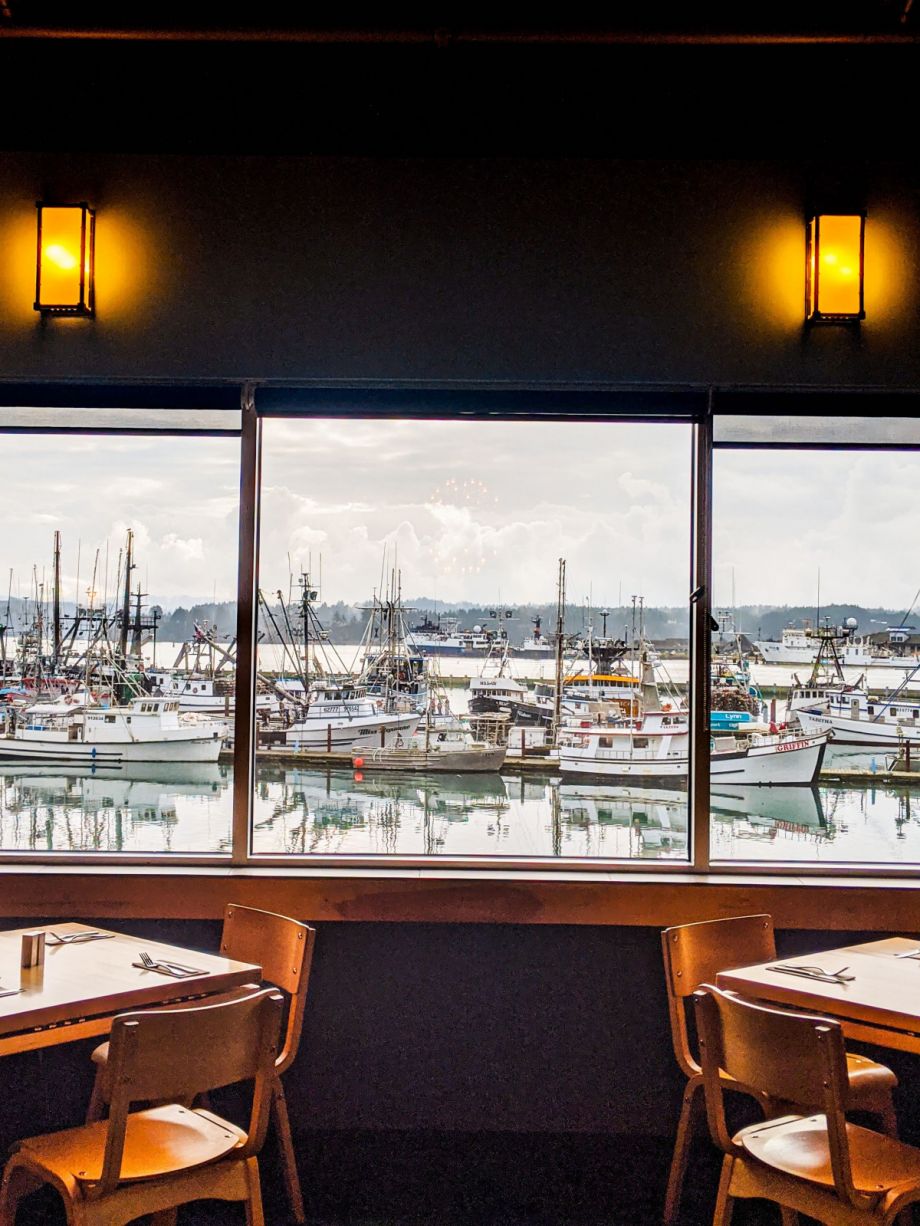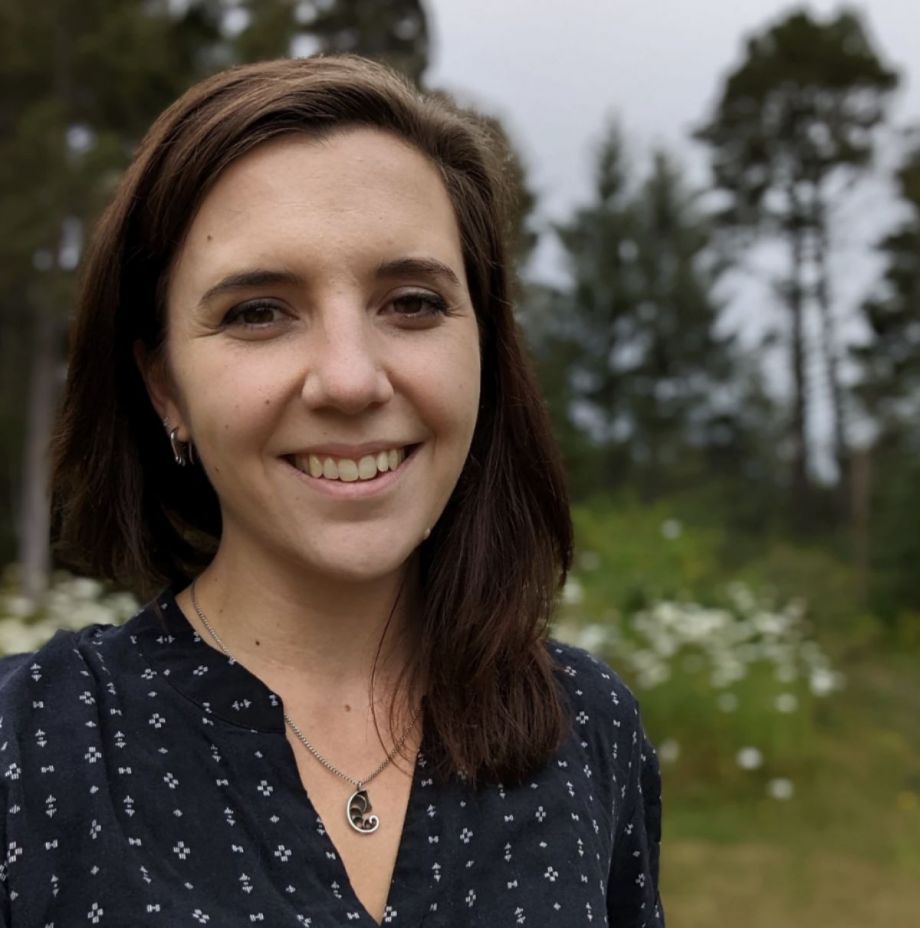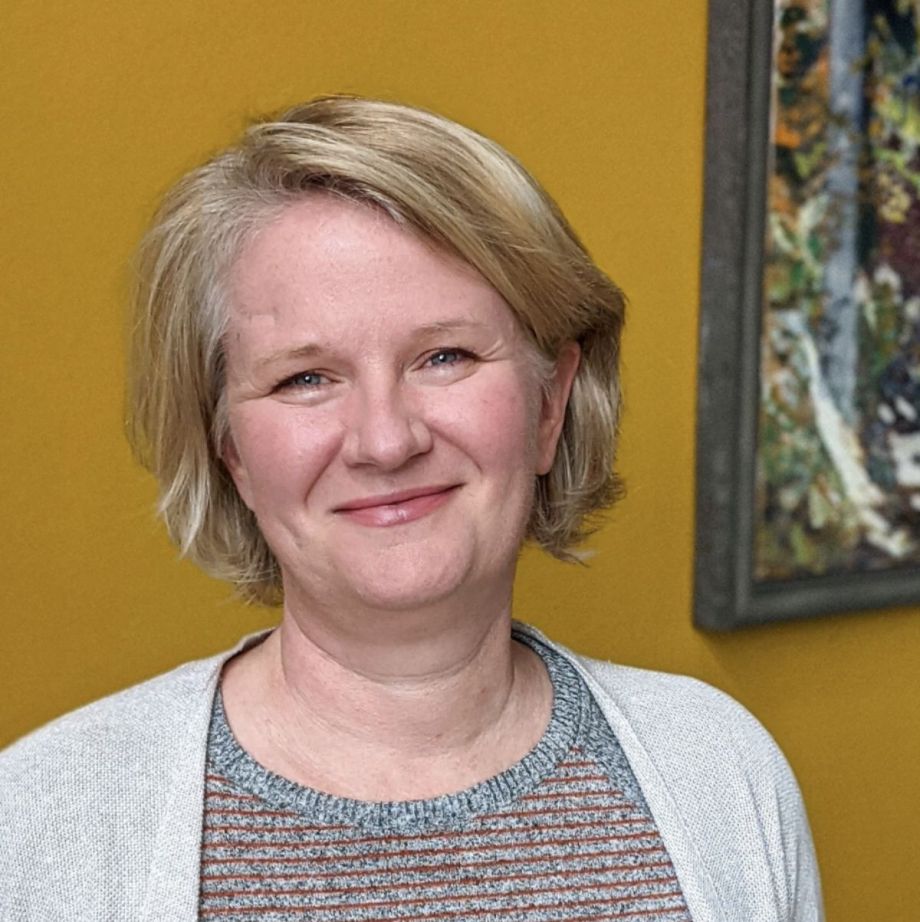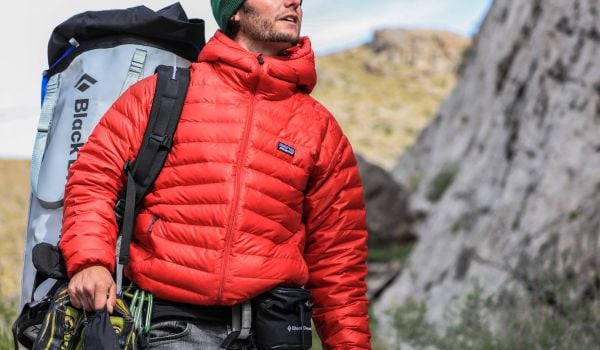Every year, Laura Anderson gives dozens of what she calls “Dock Walks.”
They start at Local Ocean Seafoods, right on Newport’s downtown waterfront, called the Bayfront. In 2005, Anderson co-opened the beloved local restaurant and seafood market, which this month adopted a rare alternative ownership model similar to what Patagonia’s owner did for his multi-billion dollar company this past summer.
Anderson often starts the Dock Walk explaining how she comes from a fishing family, and grew up catching salmon and crabbing on her father’s commercial fishing boat. After sharing her family’s fishing history, she tells attendees about the seafood laid out for sale in the display case at the front of the restaurant. A majority of species in the display case, she explains, as well as seafood cooked and served at Local Ocean, comes off the boats like her father’s, all of which are docked right outside the restaurant, across the street at Newport’s main commercial marina.

(Photo by Issie Corvi)
“Then we go down on the docks,” Anderson says. “Usually on the inside fingers are the smaller boats. Then on the outer fingers are typically the larger boats, but really there’s no boat in our fleet that gets too far over 80 feet. They’re all much smaller than, say, a large Alaskan boat or a super trawler, anything like that.”
Some of the questions from Dock Walkers these days can get pretty thorny: How much fishing is too much? How do you effectively regulate the industry? How is climate change affecting things? There may not always be clear answers, but Anderson is well-equipped to discuss, with a master’s degree from Oregon State University’s interdisciplinary program in Marine Resource Management. There, she studied how human beings manage their relationships with bodies of water and everything in them.
The Dock Walk ends back at the restaurant with a meal, of course. Between the restaurant and “DockBox,” a CSA-like seafood DIY home meal kit program created to keep the restaurant afloat during the pandemic, Local Ocean now employs nearly 80 people. The tourist season this past summer was one of their biggest yet. Anderson could hardly have picked a better moment to sell the business — but not to another person, not even to another group of people.
She didn’t technically sell it to anybody. Anderson sold Local Ocean to its mission.
Local Ocean’s new owner is a special purpose trust meant to protect the business’s mission of supporting the local, sustainable commercial seafood industry. There are some similarities with this summer’s announcement from Patagonia, in which the clothing company’s founder gave away his ownership of the company to a new structure that is intended to protect Patagonia’s larger mission around environmental sustainability. (Check out a webinar I hosted on Patagonia’s move and the perpetual purpose trust model.)
But there are some big differences. In Local Ocean’s case, Anderson didn’t have to give away her business; she received a fair price for the sale, like any typical small business owner selling their company. And Local Ocean isn’t a prominent multinational brand, but a beloved local business that happens to have a strong sense of social purpose beyond profits.
It took a variety of institutions behind the scenes to help convert the business to its new ownership structure, but those institutions are very much looking to work with other businesses with similarly strong social purposes to achieve the same goal of selling to mission.

(Photo courtesy of Local Ocean)
Originally from Portland, Elizabeth “Issie” Corvi first learned about Local Ocean on a Dock Walk when she was out in Newport for a semester, studying marine biology as an undergrad at OSU. She came to work at Local Ocean as a back-office worker after returning to Newport for her graduate studies in 2019. She rose through the ranks quickly, and is now serving as Local Ocean’s interim CEO under the new ownership structure. Anderson remains in a leadership role as CFO.
“I’m a marine biologist working in a seafood restaurant,” Corvi says. “Applying for a part-time job here, it was intimidating. This definitely is not the job I thought I was going to have while in school.”
Anderson says she had been thinking about some kind of employee ownership structure since Local Ocean’s early days. She even kept a file of readings and documents for Employee Stock Ownership Plans, or ESOPs, the most popular form of employee ownership across the country. But those plans were waylaid by the chaos of managing a growing business, which included acquiring Local Ocean’s building from its previous landlord, back in 2014.
When Anderson came up for air in 2021, the roughest days of the COVID-19 pandemic were behind her, and the ecosystem for employee ownership conversions had become much more robust. There were more feasible options to discuss beyond ESOPs. To get the conversation going, Anderson turned to the Oakland-based nonprofit Project Equity. As Next City covered previously, Project Equity launched an initiative in 2019 to support more legacy business owners with conversions to various forms of employee-ownership.
In early 2021, over Zoom, Project Equity laid out the options during a kickoff meeting with Anderson and more than a dozen of Local Ocean’s staff, including Corvi, service staff, and line cooks.
ESOPs were one of the options. But Anderson had already started moving away from the model. While there can be exceptions, it generally ends up operating more like a retirement benefit for employees who have stuck with the same company for many years, and the restaurant business has a notoriously high turnover rate.
“I did not believe that deferring benefits until retirement would be a viable way to engage our young workforce,” Anderson says. “We’re an industry that is known for having quite a bit of turnover — young people, first job. So trying to get people to feel like they have ownership or have benefits when they’re not going to see that benefit for 40 years in the future is just not compelling.”
High turnover also became an argument against a worker-owned cooperative structure. While there are some exceptions among restaurants, it’s generally challenging for employees in a high-turnover environment to buy-in as cooperative owners and participate in long-term planning.
But there was a third option presented at that first meeting with Project Equity. It still goes by different names, since it’s a newer option and it comes in a few different variants — steward ownership, perpetual purpose trust or employee-ownership trust. Local Ocean has been using the last variety, since it is prioritizing employees in its new ownership structure.
But technically the employees aren’t owners — nobody is the owner. The new special purpose trust that owns Local Ocean is not a person, it’s a legal entity meant to represent the broader social mission of the business, which includes providing dignified, well-paying jobs.
“What I really like about the trust is that there is no ownership,” Anderson says. “It’s the end of ownership. The trust is not a person, the trust does not need income, the trust just holds the purpose.”

(Photo courtesy of Local Ocean)
Part of the inspiration behind the new model came from Organically Grown Company, another Oregon business and one of the leaders in the organic food movement. As Next City covered in 2019, Organically Grown Company had its own journey through various ownership structures including an ESOP, but eventually converted into a steward ownership model. Organically Grown Company’s journey even compelled a successful movement in Oregon to create a new special purpose trust entity under the state’s trust law.
After deciding to go with a steward ownership model, Local Ocean brought in Alternative Ownership Advisors to facilitate the months-long process to build out the special purpose trust under Oregon’s new special purpose trust law. Alternative Ownership Advisors is actually an affiliate of Organically Grown Company, created after that company’s conversion to support others doing the same.
Over the course of a few months, a smaller group of Local Ocean employees, including Corvi and some of her longer-tenured colleagues, sat down to hash out the values and principles that the trust would eventually be empowered to uphold. They eventually settled around a dozen core principles, with one or more key metrics to monitor or track progress. The metrics aren’t set in stone. Part of Corvi’s job now is reporting on them and figuring out if there are more or better ways for the business to live up to its core principles.
“We started with a huge whiteboard,” Corvi says. “At the time, we were very in this mindset of using a kind of a triple bottom line mentality, people and planet and profit, helping categorize and think about the work we do, sorting out the core values that we had written up from the past and our mission and our other visions and desires into buckets. It was definitely an iterative process.”
Next, the group had to decide the composition and the process to select the trust stewardship committee – the actual set of folks who control the trust. In Local Ocean’s case, its trust stewardship committee consists of two to three employees, one Local Ocean board member, and one to two community members with experience in sustainable seafood or the food industry. The initial trust stewardship committee’s employee representatives will be picked out by the restaurant’s current leadership, but after their initial terms are up, employees will get to elect their representatives on the trust stewardship committee.
“Really, how we’ve developed our perpetual purpose trust is about the employees more than anything else, our fishermen partners, and then our local community,” Corvi says.
While some of the fundamental elements around a small business owner selling to mission are wildly different from a conventional sale, some are the same. Similar to selling a business conventionally, unless the owner is already wealthy enough and not interested in profiting from the sale, selling to mission still relies on the leveraged buyout structure.
In a leveraged buyout, the business itself takes out a loan to cover at least part of the cost of buying out the previous owner or owners, then the business transfers its controlling shares to the new ownership — be it another person or a private equity firm, or in the case of Local Ocean ownership, a special purpose trust incorporated under state law in Oregon. The main advantage of using a leveraged buyout structure when selling to a mission is that the special purpose trust doesn’t need to have any cash of its own to acquire the business.
But it can still be a challenge for a business to get a loan to finance a leveraged buyout if its new owner isn’t an individual or an investor. Anderson says they went to a traditional bank first, but she says the bank couldn’t do the deal without collateral from the business. Often in a conventional buyout situation, instead of business collateral, a traditional bank can access a federal loan guarantee from the U.S. Small Business Administration — but that program requires the new owner to sign a personal guarantee, essentially putting up their personal assets like a home or vehicles up for collateral. The trust is neither a person nor did it own any assets before acquiring Local Ocean, so it can’t sign a personal guarantee.
Instead, working with Alternative Ownership Advisors, Local Ocean Seafoods turned to Shared Capital Cooperative, a community development financial institution based in the Twin Cities. Shared Capital was created in 1978 to make loans to cooperatives, including housing co-ops, food co-ops and worker-owned co-ops. It now works all across the country, and since it specializes in lending to co-ops that don’t have a traditional ownership structure, Shared Capital doesn’t require personal guarantees for any of its loans.
Although Local Ocean isn’t technically a co-op, Shared Capital Cooperative senior loan officer Mark Fick says the employee voice built into its new ownership model was robust enough to convince the community development lender that the loan represented an expansion of the cooperative movement as it was founded to support.
“We are underwriting the democracy within the business as well as the finances of the business,” Fick says.
This story has been updated to correct the spelling of Mark Fick’s name. We regret the error.
This article is part of The Bottom Line, a series exploring scalable solutions for problems related to affordability, inclusive economic growth and access to capital. Click here to subscribe to our Bottom Line newsletter.

Oscar is Next City's senior economic justice correspondent. He previously served as Next City’s editor from 2018-2019, and was a Next City Equitable Cities Fellow from 2015-2016. Since 2011, Oscar has covered community development finance, community banking, impact investing, economic development, housing and more for media outlets such as Shelterforce, B Magazine, Impact Alpha and Fast Company.
Follow Oscar .(JavaScript must be enabled to view this email address)













